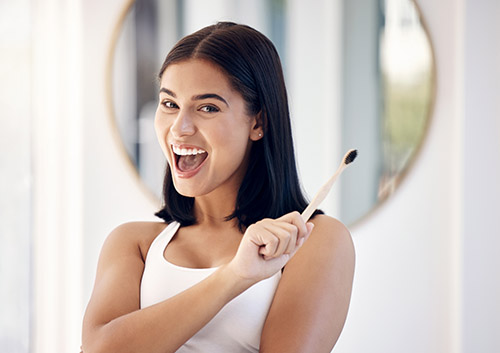Educational and Entertaining Enamel Experiments
November 13th, 2024

Let’s talk about the science of our teeth for a moment. Our enamel has a very high mineral content, making it extremely strong. In fact, enamel just happens to be the hardest substance in our bodies. But, unfortunately, it is not indestructible! Certain foods we eat can actually damage the surface of our teeth. Some simple and entertaining experiments can show children how our teeth can be affected by things we eat and drink, and how we can help protect them.
If you have a science-minded student at home, there are many activities you can do together, using educational websites, common household products and lots and lots of eggs. (Why eggs? Eggshells are a great substitute for teeth in these experiments. Not only are they various shades of white--like our own teeth, they are also calcium-rich—like our own teeth.) You can find any number of experiments using uncooked eggs, hardboiled eggs, whole shells with the contents blown out, or eggshells alone, so you can find just the right activity for whichever egg treatment works best for you.
Examine Enamel Erosion
One of the ways we protect our teeth is with healthy eating. The bacteria in plaque use the sugars and starches in our foods to produce acids. These acids are the substances that break down the minerals in our enamel and leave the enamel weaker. Weaker enamel is more easily attacked by bacteria and acids, which leads to cavities.
With eggs or eggshells and some carefully selected food products, you can see just how acidity affects teeth. Different websites suggest a variety of acidic liquids to dunk your eggs in, such as vinegar, soda, or citrus juices, so it’s easy to find an experiment that works with your pantry. Always use a plain water sample when you submerge eggs or shells to act as a control to measure differences against. How do the egg shells soaked in acidic liquids differ from those in plain water? It’s also fun to add simple sugar water as a test liquid to see what happens. Is it sugar or acid that causes more damage? And why might that be?
The Fluoride Fix
Fluoride is well known as a mineral that protects the structure of our teeth and helps prevent cavities. And there are actually experiments out there to test the protection fluoride provides using your egg stand-ins.
In some experiments, a hardboiled egg is coated with fluoride toothpaste or rinse for a specific amount of time and then dunked into vinegar. An untreated egg also gets a vinegar bath. You are asked to observe what is happening to each egg as it sits in its vinegar bath—are there bubbles on one egg and not the other? What do the bubbles mean? Other experiments require longer exposure to fluoride and then to vinegar—what happens to the shells of the treated and untreated eggs? What could this mean for our teeth?
Staining Studies
Our diet can do more than help create cavities. Enamel is very strong, but it is not stain-proof! Dark colored foods and drinks can make our teeth appear darker or more yellow. (And teeth that have suffered enamel erosion can pick up stains more easily.) How does food affect the brightness of our smiles?
If this question interests you, find experiments that use favorite beverages as a soak for your eggs. Choose liquids with a range of color, such as coffee, soda, and apple juice. Or choose an experiment that uses different varieties of soft drinks. Will foods the same color cause the same amount of discoloration in your egg volunteers? Do you want shorter or longer soaks in each liquid? Do you want to make use of a recycled toothbrush to see if brushing that discolored shell makes a difference? With toothpaste or without?
Even though these activities are designed for older children, they still require adult supervision. You can find detailed instructions for any of these experiments at many science and educational sites online. With some household supplies, plenty of extra cups, and a quantity of eggs, you and your child can demonstrate some of the basic effects our food choices have on the health and appearance of our teeth. It’s a wonderful way to promote healthy eating and brushing habits, scientific curiosity, and shared experiences!
Don’t forget to let Dr. Jeffery Spahr and Dr. Janna Spahr know how your experiments turned out the next time you visit our Lincoln, NE office!





